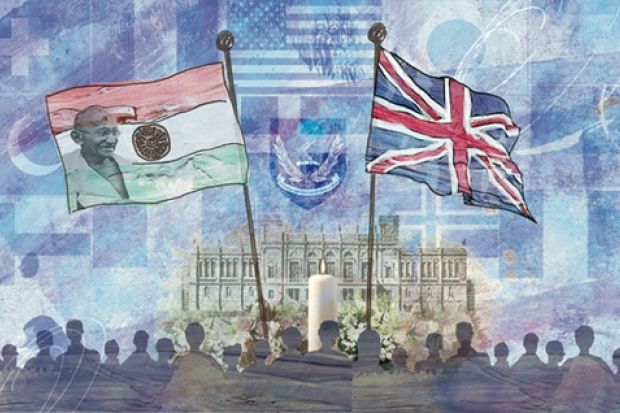On the night of 2 January, in a quiet street in Ordsall, Salford, a crowd of hundreds gathered around a lamppost and placed candles and flowers in front of a photograph of a young Indian man, Anuj Bidve. There were local people who had been outraged by the senseless murder of the 23-year-old microelectronics student from Pune. But also present were overseas students who had heard about the event on Facebook and Twitter. Four days later, after a visit to Parliament, Anuj's grieving and desolate parents, Subhash Dattatray Bidve and Yogini Subhash Bidve, visited the same spot.
Despite the fact that this occurred in England, news of this crime has had a profound impact in India.
Britain has an enviable reputation for education. It is a premier brand and one of our most admired assets. You have only to look at the educational background of the world's leaders to see how many of them studied in the UK and how many are extremely proud of this heritage. The latest figures show that 334,815 Tier 4 student visas were issued to overseas students to study in the UK in 2010. In the past five years, India has been our largest source of overseas students. A total of 187,763 Tier 4 student visas were issued to Indian students between 2005 and 2010.
The value of overseas students to the UK economy has been put at £12.5 billion annually. In the current climate, the income for our universities generated by overseas students is even more important. In the light of the near tripling of tuition fees from 2012-13, cuts of up to 80 per cent to universities' teaching grants, the virtual elimination of capital funding and the complete withdrawal of support for the arts, humanities and social sciences, a significant reduction in overseas student numbers will have a dramatic effect on universities and the local and national economies.
The tragic event in Salford could not have come at a worse time, not only for these reasons but also given the unhelpful messages sent out by certain sections of the government regarding overseas students and net immigration. During the recent Home Affairs Committee inquiry into student visas, ministers from the Foreign and Commonwealth Office and the Department for Business, Innovation and Skills loudly proclaimed the virtues of undergraduates and researchers coming to the UK to study. However, universities minister David Willetts' view of the student world and Britain's pivotal place in it was not shared by the immigration minister Damian Green.
Only the other week, Green delighted in the fact that the number of people coming to study here from overseas had dropped by 13 per cent compared with a year ago. Would these have been bogus students going to bogus institutions? It is unlikely, but this does not appear to matter to Green.
The unanimous view of the select committee was that students should not even be counted as immigrants. They come for a short period, not all their lives, and leave when their studies have concluded.
At the same time as the vigil was being held in Salford, a peace march was being organised in India, a march that ended at the British High Commission. Commentators in India were already drawing parallels between the murder of Anuj and the spate of racial attacks on Indian students studying in Australia in 2009. The Australian government's failure to understand the concerns of the Indian diasporas resulted in a stern rebuke from the Indian foreign minister and a reduction in the number of Indian students studying in Australia.
We need to handle this well. So far the signs are excellent. Greater Manchester Police, ably led by assistant chief constable Dawn Copley, have arrested and charged an individual for the murder. With this news arriving in the week in which we finally received a verdict on two of the killers of Stephen Lawrence, 18 years after his death, this is a praiseworthy achievement. Lancaster University, where Anuj was studying, is paying for the repatriation of his body, and Salford City Council, on the advice of its chief executive Barbara Spicer, covered the cost of police officers travelling to Pune to give a detailed account to Anuj's parents of what had occurred.
But we need to try even harder. After the trial, we need a full and comprehensive report of exactly what happened so that everyone can know the full facts. There also needs to be a visit to India - organised by the government and including universities - to foster and encourage even greater links between India and the UK.
But, above all, we want a swift and fair trial so that the criminal justice system will match the great dignity of the Bidve family. Nothing less will do.
Register to continue
Why register?
- Registration is free and only takes a moment
- Once registered, you can read 3 articles a month
- Sign up for our newsletter
Subscribe
Or subscribe for unlimited access to:
- Unlimited access to news, views, insights & reviews
- Digital editions
- Digital access to THE’s university and college rankings analysis
Already registered or a current subscriber?
